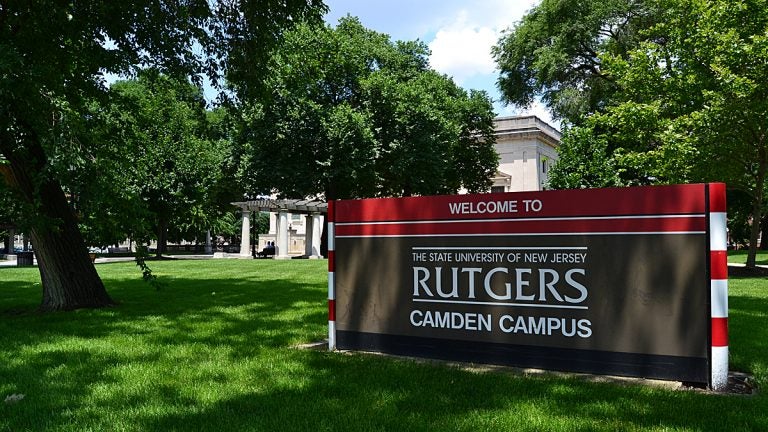Will censure of Rutgers Camden law hurt enrollment?

(Marcus Biddle/for NewsWorks)
A small gray box at the bottom of the website for Rutgers School of Law-Camden contains the word, “Censure.” Click on it, and documents reveal how the school broke admissions rules.
The sanction couldn’t have come at a worse time: Enrollment at law schools is falling nationwide and, in the wake of an unsuccessful bid to merge the Rutgers University Camden campus with Rowan University, enrollment at the law school plummeted by more than half.
But is the recent censure by the American Bar Association as bad as it seems?
“It’s a technical violation,” said Rayman Solomon, dean of the law school, which is no longer poised to merge with Rowan, but, instead, Rutgers School of Law-Newark.
Solomon acknowledges that Rutgers Law-Camden failed in 2009 to seek special permission, or a variance, to admit some students based on scores from graduate admissions exams (GRE) – bypassing altogether the Law School Admission Test.
But he says the alternative admissions process – ultimately approved by the ABA – was intended for prospective students who missed inflexible LSAT test dates and were pursuing joint degrees in law and business administration.
“Applications weren’t falling at the time we did this,” Solomon said. “No students were hurt by this.”
The school’s standing hasn’t been hurt by the censure, either – at least in the annual rankings of law schools by U.S. News & World Report, often the starting point for would-be applicants.
Because students who never took the LSAT comprised less than 10 percent of the student body, U.S. News disregarded them. “In terms of the U.S. News ranking, it doesn’t mean anything,” said Robert Morse, who develops the data-based methodologies and surveys behind the list.
Still, it remains to be seen whether the censure – which was announced last December, and carries a $25,000 fine – will have repercussions among those who matter most: prospective students.
Numbers of first-year students at Rutgers Law-Camden tumbled from 282 to 116 between 2011 and 2012, around the time Gov. Chris Christie proposed merging Rutgers-Camden with Rowan: applicants faced the prospect of enrolling in Rutgers, but graduating with a Rowan degree.
While current first-year numbers have improved, hovering at around 140 students, the law school has yet to fully recover. Now the taint of censure complicates a decision-making process already confused by the unresolved logistics of combining schools in Camden and Newark to form Rutgers School of Law.
In years past the ABA likely would have meted out its punishment in private. But an ABA spokesman said Rutgers Law-Camden ran afoul of ABA procedure at a time when the organization is becoming more transparent in response to growing scrutiny of legal education.
“The censure is just a way of saying, ‘Look, rules are out there, and schools are supposed to follow them,'” said Barry Currier, the ABA’s managing director of accreditation and legal education.
“[Rutgers Law-Camden] just didn’t follow the appropriate processes. They weren’t the first ones to do it, they haven’t been the last ones to do it… Eventually what they were doing was something the [ABA] was willing to let them do, they just started before they got the necessary approval.”
Over the past year the ABA also has censured law schools at the University of Illinois and the University of Kansas; Illinois was fined $250,000 for intentionally publishing false admissions data, and Kansas was fined $50,000 for enrolling students in an unapproved degree program.
Among the options at the ABA’s disposal, said Currier, the penalties levied against Rutgers Law-Camden are the least severe.
Currier is quick to distance the ABA action from the forces behind the plan to allow Glassboro-based Rowan to absorb Rutgers-Camden – even though the investigation into the law school’s admissions practices took place at around the same time state officials floated the idea.
“This was an independent matter,” he said.
The ABA ultimately gave Rutgers Law-Camden the go-ahead to continue admitting students who hadn’t taken the LSAT, but by May 2012 the law school had ended the practice in order to simplify the merger with Rutgers Law-Newark, which only accepts LSAT results.
Rutgers officials originally projected a unified Rutgers Law would be ready to admit students as early as next fall. But in a statement last week Rutgers Law-Camden said the merger “is taking longer than we had anticipated” in light of the integration into Rutgers of most schools and units of the University of Medicine and Dentistry of New Jersey.
The uncertainty over mergers proposed and real – coupled with a sluggish job market for law school graduates – is keeping enrollment down at Rutgers Law-Camden. Still, Solomon is hopeful the censure won’t scare off more students.
“I don’t think it’s going to have any effect. It doesn’t show we’re a sleazy law school,” Solomon says. “It came about because we were trying to accommodate students.”
WHYY is your source for fact-based, in-depth journalism and information. As a nonprofit organization, we rely on financial support from readers like you. Please give today.




